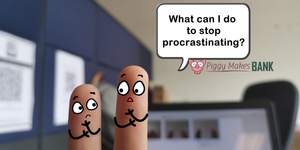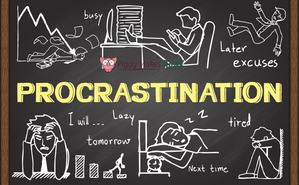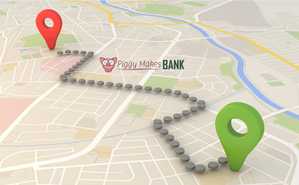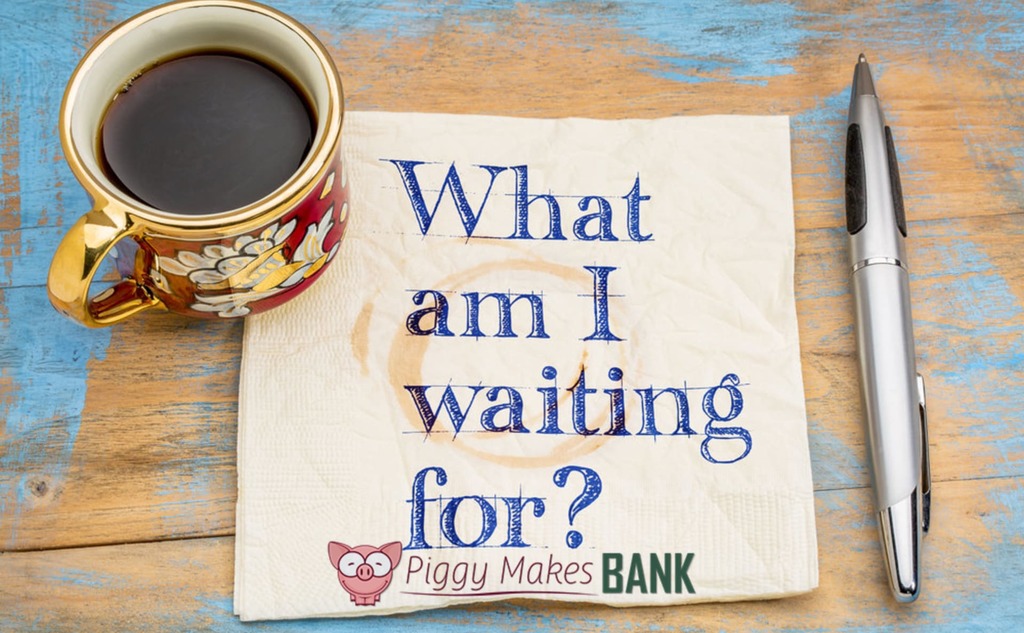I (Susanne) found myself procrastinating on two different projects this morning. It happens to all of us, but it costs us valuable time and energy.
To stay productive and focused on those all-important money-making tasks, we have to figure out how to stop procrastinating.

The first step is to realize when you’re doing it and then figure out why you’re procrastinating. With that information in hand, it becomes easier to stop.
Why do we procrastinate? There are a couple of common reasons. Let’s run through them. And in case you’re wondering … yes, I’m writing this to help remind myself what I need to do to get out of procrastination mode.
We Procrastinate Because We’re Afraid
This is a big one for me. Whenever I’m not sure about what I’m doing, or am trying something new, something where I put myself out there, I tend to procrastinate. This happens when I’m supposed to be working on a presentation for an event or a webinar. It happens when I agreed to do a series of Facebook lives, and most recently (as in this morning), it’s happening when I’m trying to write fiction.
New tasks are hard. It’s much easier to go back to something we’re comfortable doing. Part of the fear is being afraid of doing things wrong. What if we make a mistake? What if we don’t get the results we’re hoping for? By not doing the hard stuff, we don’t have to face those fears or risk disappointment.

How To Stop Procrastinating Out Of Fear
My approach to this is two-fold. The first is a simple little exercise I call “What’s the worst that could happen ?”. The idea is to acknowledge the fear and then imagine the worst possible outcome. Ask yourself if that’s something you can live with. More often than not, the answer is yes. And it’s the worst possible outcome, so chances are good that it won’t be all that bad.
Here’s an example. For decades, I’ve dreamed of being a fiction writer. I’ve had half-finished novels in my desk drawer since I was a teenager. None ever got finished because then I’d have to face the decision of trying to publish it. The worst that could happen would be that people would buy my book, hate it, and leave a bad review. Reviews I could learn from and help me become a better writer. So I started publishing under a pen name. That made it easier. If my books were a complete mess, I could ditch the pen name and go back to square one. Of course none of that happened and my reviews have been lovely, but the pen name helped me get over my fear of publishing.
We Procrastinate Because We’re Overwhelmed
This is another big one for me. When I have too much on my plate, I tend to not work on any of it. It happens to all of us. When there is too much going on, it’s easier to shut down. Or walk away and watch a new series on Netflix instead. Think back on a time when you felt particularly overwhelmed. Did you procrastinate more than usual?
This overwhelm is closely related to analysis paralysis and the phenomenon that people choose nothing at all when they are given too many choices. To get moving on making progress, you have to choose something and take action.
How To Stop Procrastinating Because Of Overwhelm
If you’re in the same boat, try picking one or two easy things that you can do right now. Not only will it decrease that list of “what I should be doing” stuff down a little, it helps you create momentum. You start to take action and before you know it, you’ve gotten past the procrastination stage and are busy working away.
My favorite long-term solution for this is two-fold. I use an “idea bucket” and a “top 3 list”.
Let me explain. When I am feeling particularly overwhelmed, the first thing I do is make one long list of everything I have to get done. I don’t judge, I don’t sort. It doesn’t even matter if it’s stuff I have to do around the house, in my business, in the garden … if it’s something I should be doing, it goes on the list. Then I walk away for a bit. I come back with a clear head and fresh eyes and start to cross out the things I think I “should” do, but don’t really need to do. After that, I sort them by main category (work, house etc.) and keep those as idea buckets.
Every evening, I sit down and think about the three most important things I want to get done the following day. Most of the time, these are things I know I need to do, but I also reference the idea list to make sure I’m working on the most important tasks. I write them down and then work on those three tasks first thing in the morning. That way my day starts off productive and I don’t procrastinate on them.
We Procrastinate Because We Don’t Have A Plan
Last but not least, we often find ourselves procrastinating because we don’t have a plan. When you don’t know what you should be doing and more specifically, what you should do first, second, and third, it’s hard to get started or make progress on anything. That’s why it’s important to come up with a plan. And yes, you can use your plan in combination with the Top 3 Tasks list I shared earlier.
How To Stop Procrastinating Because Of A Lack Of Direction
 Think of it as a road map to get you from point a to point b. Point A is where you’re at right now. Point B is where you want to be. Here’s an example. Let’s say my plan is to create a lead magnet to grow my email list. If this is something I’ve never done before, it seems like a daunting task. But with a plan, it become doable. Point A is knowing I need a lead magnet. Point B is having it created and uploaded, ready to be downloaded. How do we get from Point A to Point B? It will include several steps including:
Think of it as a road map to get you from point a to point b. Point A is where you’re at right now. Point B is where you want to be. Here’s an example. Let’s say my plan is to create a lead magnet to grow my email list. If this is something I’ve never done before, it seems like a daunting task. But with a plan, it become doable. Point A is knowing I need a lead magnet. Point B is having it created and uploaded, ready to be downloaded. How do we get from Point A to Point B? It will include several steps including:
- Choosing a topic for the lead magnet report.
- Writing the report or repurposing other written content.
- Formatting it and adding a pretty cover image.
- Turning it into a downloadable pdf.
- Uploading it to my website.
- Creating a download page and an opt-in form.
With that plan in hand, you know what you need to do first. For this example, my first job would be to decide on a topic and then get to work on creating the short report. No need to procrastinate.
This method also allows you to focus on one step at a time. No need to worry about how to upload it until you get to that part. This eliminates fear and overwhelm and helps you get moving in the right direction.

We (Tracy and I) hope you found this post on beating procrastination and staying productive helpful. Our goal for you is two-fold. The first is for you to stop procrastinating and getting more done. If you’ve been procrastinating about using PLR, we encourage you to grab a copy of our FREE “What The Heck Is PLR” guide. It’s full of ideas for using and making the most of all your pre-written content.
Our second goal is for you to inspire your community to beat procrastination. If you’re ready to tell them how they can stop and challenge them to get more done, take a look at our FREE PLR 7 Days To Beat Procrastination. Download it, tweak it for your particular audience and help your readers, subscribers, and customers get more done.
